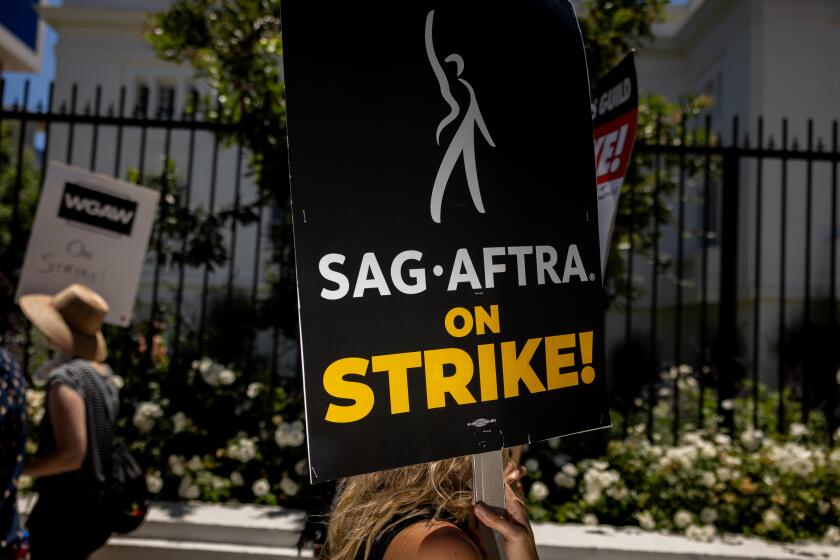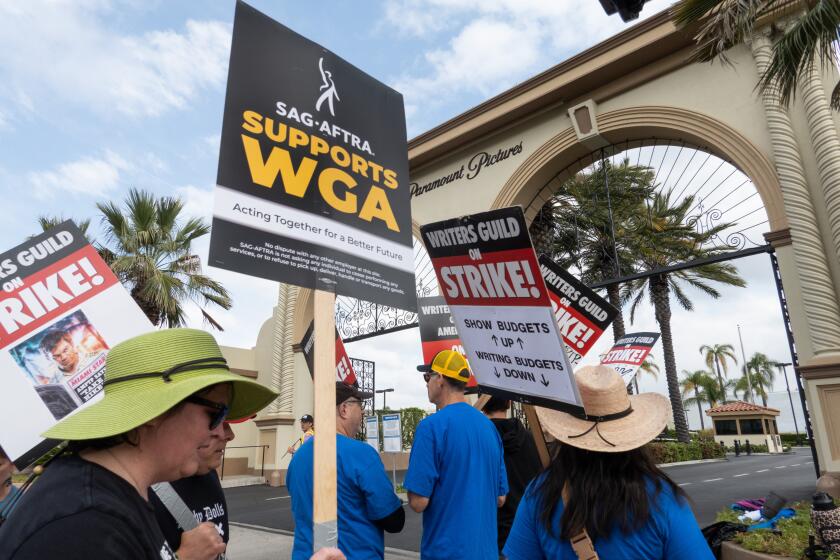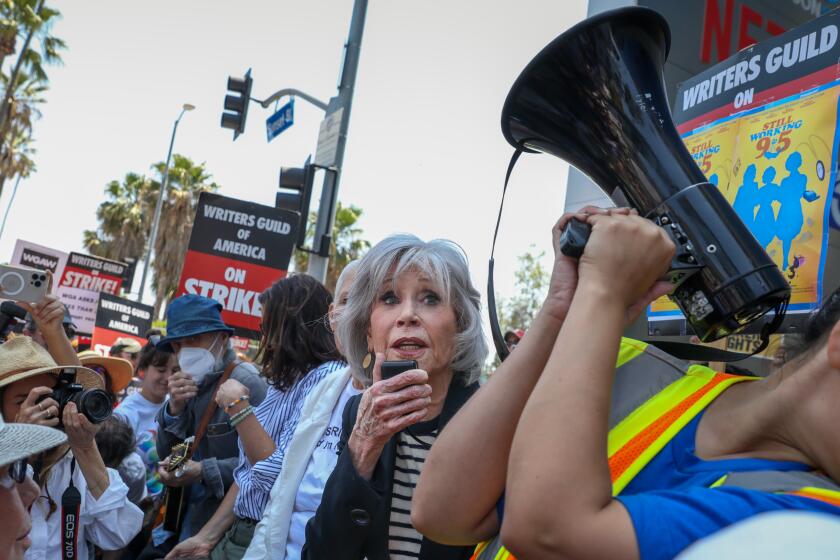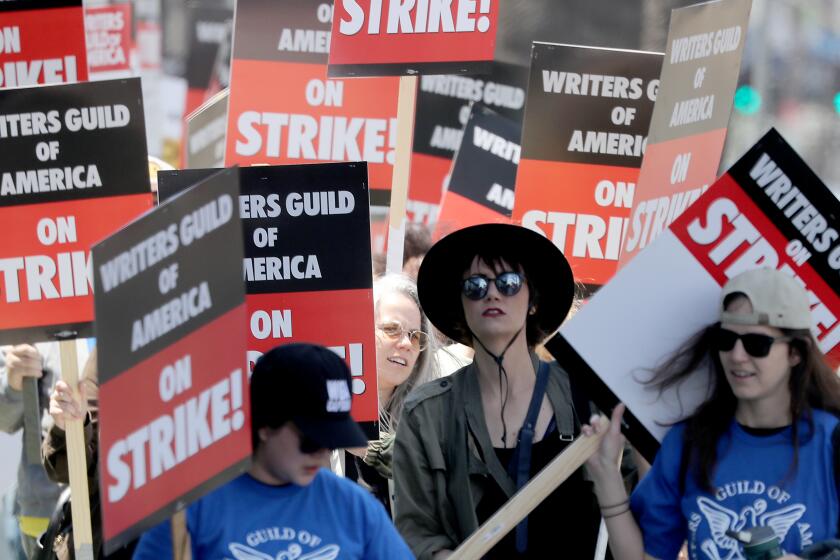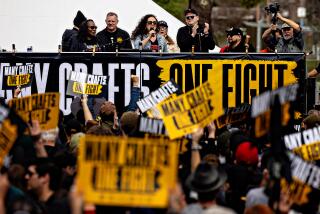Hollywood studios could face two strikes for the first time in 63 years. How did we get here?
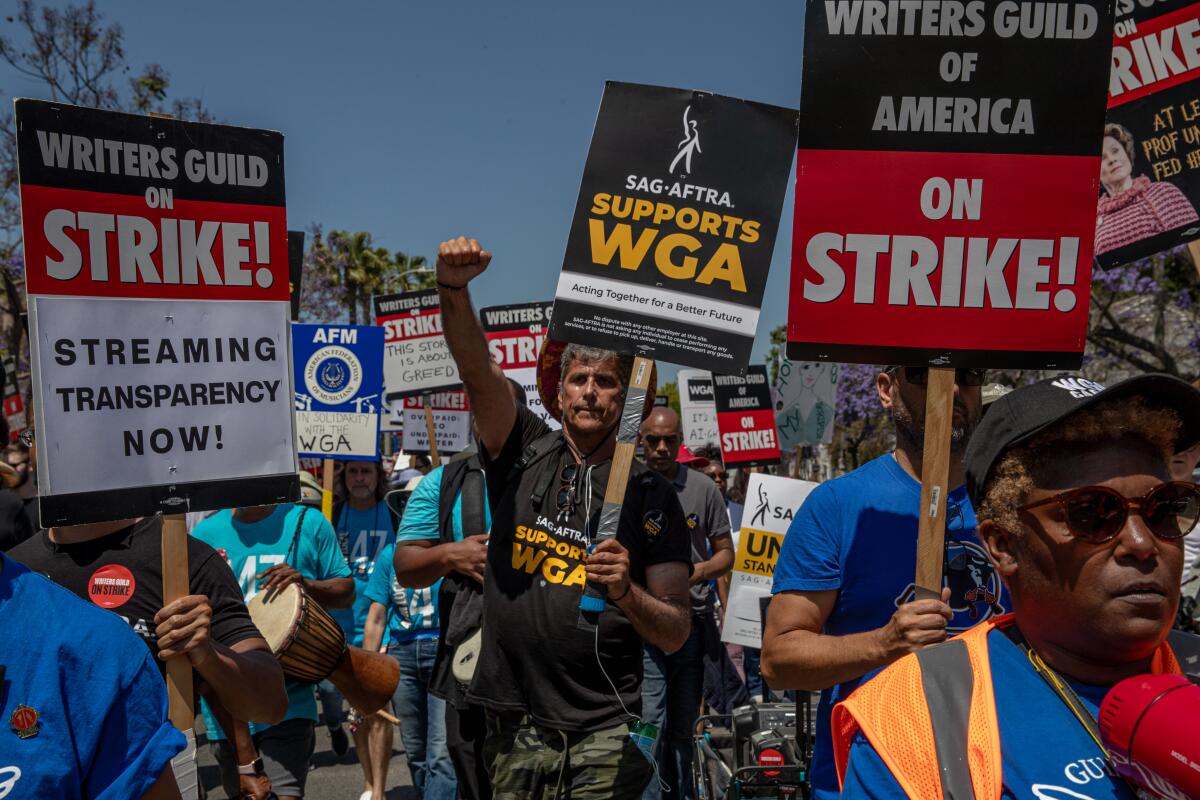
- Share via
The year was 1960. An actor named Ronald Reagan was president of the Screen Actors Guild, which was at the time fired up about residuals over films licensed to or sold to TV.
The result was a strike that lasted March 7 to April 18 and halted movies starring such luminaries as Elizabeth Taylor, Jack Lemmon and Marilyn Monroe.
Actors joined the industry’s writers, who had already been on strike since January of that year. The writers’ strike was long — their dispute lasted 148 days — and centered on income that screenwriters would get from movies airing on television and other issues.
Sixty-three years later, Hollywood is once again in the midst of a historic labor battle in which studios are facing a possible strike on two fronts in a protracted battle over new forms of distribution.
SAG-AFTRA members have authorized their leaders to call a strike if they can’t reach a deal with the major studios by Wednesday night, when their extended contract officially expires. They would join members of the Writers Guild of America, who have been on strike since May 2, broadening a labor conflict that has already disrupted film and TV productions nationwide.
How did such an extraordinary standoff come about? Historians and labor experts cite several explanations, including greater cohesion among Hollywood unions, a nationwide rise in labor activism after the COVID-19 pandemic and, perhaps most important, dramatic technological change.
SAG-AFTRA has approved a deal from the studios to end its historic strike. The actors were on strike for more than 100 days.
Almost as long as there has been an entertainment industry, there has been labor strife. And, more often than not, that conflict has nearly always coincided with new technologies that have disrupted how filmmakers, creatives and other industry employees have been paid and their work distributed.
Since 1936 the industry’s unions — often led by the Writers Guild — have gone on strike some 20 times fighting for fair and adequate compensation in the face of challenges arising out of unregulated technological advancements such as kinescope recordings, television, cable, videocassettes, DVDs — and now the internet.
“Technology has changed the economics,” said David Smith, a professor of economics at Pepperdine Graziadio Business School.
The last time actors went on strike against the studios was in 1980 in a three-month walkout over profits from home videocassettes and pay television. Writers struck for 100 days in 2007-08 largely to secure pay for content distributed online, setting the stage for the current conflict.
For the last two months, writers have taken to the picket lines to protest how the rapid shift in streaming, while creating an unprecedented swell in content, has significantly eroded pay and working conditions, causing what they view as an existential threat to their livelihoods.
“There’s an advent of new technology that’s widely adopted and that’s where we’re at now with streaming,” Smith said. “And it only makes sense that the existing contracts aren’t able to encapsulate all of the considerations because we’re in a new market that wasn’t able to be visualized or understood three years ago or even six years ago.”
As with writers, the streaming era has enormously affected actors, toppling the traditional payment model when broadcast networks led the way.
Eric Edelstein, 46, arrived in Los Angeles from Spokane, Wash., in 2001, dreaming of becoming a character actor in the vein of 1960s TV actors Jack Elam and Victor French. He had heard that by playing bad guys on various shows, he could pull down half a million dollars a year. “That sounds like a pretty great life,” he said.
For the last two decades, Edelstein was able to build a career doing so.
“It used to be if you had three or four guest stars a year, that was actually enough to sustain yourself on and that worked pretty well if you could get a commercial or two,” he said.
But that’s no longer the case with the dominance of streaming. In recent years he’s supplemented his income with voice-over work (he’s the voice of Daddy Shark on the Nickelodeon show “Baby Shark’s Big Show!”).
According to Edelstein, even if the SAG-AFTRA negotiators came back with a 20% increase in streaming residuals, the fees from that form of distribution would still be “so far away from how the old model used to pay.”
Case in point: Edelstein still collects checks from cable reruns of the 2015 film “Jurassic World,” in which he had a small role as a paddock supervisor for dinosaurs. In a recent quarter, the cable residuals totaled $1,400. By comparison, he received only $40 for reruns of the movie on streaming platforms during the same period, he said.
Members of SAG-AFTRA voted by a wide margin to give their leaders authority to call a strike even before negotiations have begun with the major studios.
Representatives of the Alliance of Motion Picture and Television Producers have declined to comment on the SAG-AFTRA negotiations. But people familiar with the negotiations say the studios have balked at the union’s demands, including that residuals be tied to a show’s success, and have argued that most streaming services aren’t profitable.
While streaming has upended the industry on every level, the specter of another new technology, artificial intelligence, has added another layer of trepidation to the current negotiations.
AI represents a “really radical technological change, that has the potential to alter the relationship between writers and actors in the motion picture and streaming industries,” said USC history professor Steven J. Ross.
“All [previous] strikes were about getting a better share of revenue,” Ross added. “This strike is about that, but it’s also about the fear of losing your job to AI. That’s the difference. And that’s why I think everybody sees this as a kind of high noon showdown, because now the technology is not simply about undercutting your wage. It’s undercutting your very job.”
Ross pointed to NBC‘s long-running and “highly formulaic” procedural, “Law & Order.”
According to Ross, the producers could use AI to create new episodes using the show’s style. “Then you have the first draft. You bring a writer in to polish it. That writer doesn’t get as much because they haven’t done the first draft and you don’t have a writers’ room,” he said. “For the writers, it’s an existential crisis.”
Actors express similar fears.
Matt Bush, an actor who played Andy Cogan on the ABC comedy series “The Goldbergs,” is unequivocal on the importance of securing regulations over the use of AI. Without any, he said, “it doesn’t matter what kind of wage increase we get.”
It is already standard practice for actors to be asked to sign away the rights to their characters that they play, so that the studio can use them for other ancillary revenue streams such as at amusement parks and as action figures.
Bush recalled that his character and those of other actors on “The Goldbergs” were used in an app-based video game — although he didn’t recall receiving any compensation. Bush fears the same thing will happen with AI whereby actors will be asked to give up their rights to their likenesses and voices to be used with AI as a matter of routine.
“And that’s a step that I think none of us want to take,” he said. “To give away that consent upfront is also a scary thing too, compensation aside.”
Also fueling the current labor conflict is a resurgence of union activism in Hollywood and other sectors, creating a greater level of solidarity among guilds than in the past.
If Hollywood studios and SAG-AFTRA cannot reach a deal by Friday night, actors may strike over their main film and TV contract for the first time since 1980. Here are the main reasons why.
From the first days of the writers’ strike, actors, directors and others joined the picket lines. Most crew members also have refused to cross picket lines as the WGA targeted individual productions including “Billions” and “The Chi,” forcing them to shut down.
Last month, representatives from a kaleidoscope of labor organizations including the Directors Guild of America (which recently negotiated a new contract), SAG-AFTRA and the Teamsters, as well as nurses, teachers and others, joined forces with WGA members at a rally at Pan Pacific Park in Los Angeles.
Beyond Hollywood, stagnant wages, the weakening of workplace protections, the rise of the gig economy and the COVID-19 pandemic have helped to spur greater interest in unionization nationwide.
In recent years, workers at Amazon, Google, Apple stores, Starbucks, Trader Joe’s and Activision have sought to form unions.
Although private-sector union membership has long been in decline, a Gallup poll last year showed that Americans’ favorable view of unions has risen sharply to 71%, the highest rate since 1965.
In the current environment — not to mention a pro-union Biden administration — there is a greater willingness by workers to challenge employers.
Over the recent Fourth of July weekend, thousands of service workers from 19 hotels in Los Angeles and Orange counties went on strike in what was described as the “first wave of walkouts,” seeking a boost in pay.
Another shift has been growing cohesion among actors themselves.
In 2008-09, the last time actors were poised to go on strike, their union was deeply divided — literally.
Actors were represented by two groups, SAG and AFTRA, and they were riven with internal factions — each holding opposing views about which course of action each should take in their contract negotiations with the studios. A-list actors were split and SAG’s board ousted David Allen, the group’s executive director, who pushed for a strike authorization vote.
Although a deal was reached without a walkout, the infighting severely hampered the actors’ bargaining leverage; in 2012 SAG and AFTRA merged, ending long-simmering turf battles.
The 2023 writers’ strike is over after the Writers Guild of America and the Alliance of Motion Picture and Television Producers reached a deal.
While tensions remain, this time around SAG-AFTRA has shown a much more united front and a commitment to stay the course. Notably, the two guild factions with a long history of sparring put aside their differences to back the reelection of SAG-AFTRA President Fran Drescher.
On the eve of the expiration of SAG-AFTRA’s contract with the studios, hundreds of actors, including Quinta Brunson, David Duchovny, Meryl Streep, Ben Stiller and Bob Odenkirk, wrote a letter to their union leaders with a blunt message.
“This is not a moment to meet in the middle,” they wrote, “and it’s not an exaggeration to say that the eyes of history are on all of us. We ask that you push for all the change we need and protections we deserve and make history doing it.”
More to Read
Inside the business of entertainment
The Wide Shot brings you news, analysis and insights on everything from streaming wars to production — and what it all means for the future.
You may occasionally receive promotional content from the Los Angeles Times.
